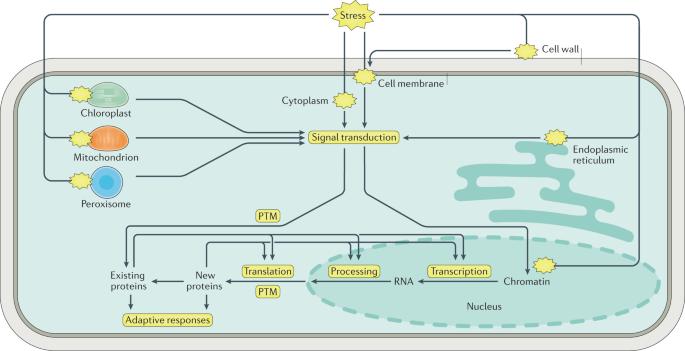Abiotic stress responses in plants
IF 52
1区 生物学
Q1 GENETICS & HEREDITY
引用次数: 367
Abstract
Plants cannot move, so they must endure abiotic stresses such as drought, salinity and extreme temperatures. These stressors greatly limit the distribution of plants, alter their growth and development, and reduce crop productivity. Recent progress in our understanding of the molecular mechanisms underlying the responses of plants to abiotic stresses emphasizes their multilevel nature; multiple processes are involved, including sensing, signalling, transcription, transcript processing, translation and post-translational protein modifications. This improved knowledge can be used to boost crop productivity and agricultural sustainability through genetic, chemical and microbial approaches. In this Review, Zhang et al. summarize our current understanding of the molecular mechanisms underlying the responses of plants to abiotic stresses, and how this knowledge can be used to improve crop resilience through genetic, chemical and microbial approaches.

植物的非生物胁迫反应
植物无法移动,因此必须承受干旱、盐碱和极端温度等非生物压力。这些胁迫极大地限制了植物的分布,改变了它们的生长和发育,降低了作物产量。最近,我们在了解植物对非生物胁迫反应的分子机制方面取得了进展,强调了其多层次性;涉及多个过程,包括感应、信号、转录、转录本处理、翻译和蛋白质翻译后修饰。通过遗传、化学和微生物方法,这些知识可用于提高作物产量和农业可持续性。在这篇综述中,Zhang 等人总结了我们目前对植物对非生物胁迫反应的分子机制的理解,以及如何利用这些知识通过基因、化学和微生物方法提高作物的抗逆性。
本文章由计算机程序翻译,如有差异,请以英文原文为准。
求助全文
约1分钟内获得全文
求助全文
来源期刊

Nature Reviews Genetics
生物-遗传学
CiteScore
57.40
自引率
0.50%
发文量
113
审稿时长
6-12 weeks
期刊介绍:
At Nature Reviews Genetics, our goal is to be the leading source of reviews and commentaries for the scientific communities we serve. We are dedicated to publishing authoritative articles that are easily accessible to our readers. We believe in enhancing our articles with clear and understandable figures, tables, and other display items. Our aim is to provide an unparalleled service to authors, referees, and readers, and we are committed to maximizing the usefulness and impact of each article we publish.
Within our journal, we publish a range of content including Research Highlights, Comments, Reviews, and Perspectives that are relevant to geneticists and genomicists. With our broad scope, we ensure that the articles we publish reach the widest possible audience.
As part of the Nature Reviews portfolio of journals, we strive to uphold the high standards and reputation associated with this esteemed collection of publications.
 求助内容:
求助内容: 应助结果提醒方式:
应助结果提醒方式:


